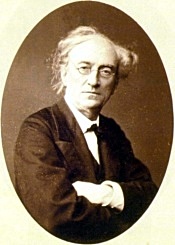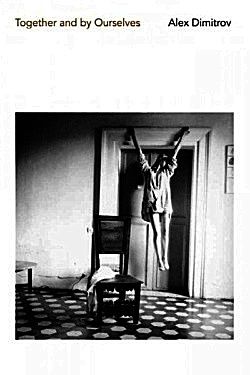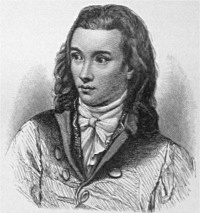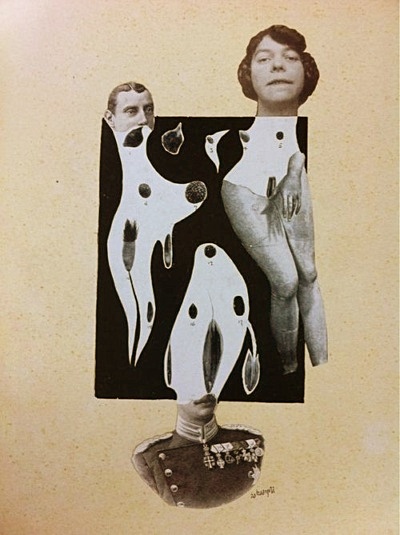Fleurs du Mal Magazine



More in: Art & Literature News, AUDIO, CINEMA, RADIO & TV, FDM Art Gallery, LITERARY MAGAZINES, POETRY ARCHIVE, PRESS & PUBLISHING, THEATRE

Fjodor Tjoettsjev
(1803 – 1873)
Alles nam hij
Álles nam Hij, toen Hij de wrake zocht:
Gezondheid, wilskracht, adem, dromen,
Maar jou liet Hij, als enige, nog komen,
Opdat ik tot Hem bidden blijven mocht.
Fjodor Tjoettsjev, Все отнял у меня…, 1873
Vertaling Paul Bezembinder, 2016
Paul Bezembinder: zijn gedichten en vertalingen verschenen in verschillende (online) literaire tijdschriften. Zie meer op zijn website: www.paulbezembinder.nl
fleursdumal.nl magazine
More in: Archive S-T, Tjoettsjev, Tjoettsjev, Fodor
Selected for the National Poetry Series by Ada Limón, I Know Your Kind is a haunting, blistering debut collection about the American opioid epidemic and poverty in rural Appalachia.
 In West Virginia, fatal overdoses on opioids have spiked to three times the national average. In these poems, William Brewer demonstrates an immersive, devastating empathy for both the lost and the bereaved, the enabled and the enabler, the addict who knocks late at night and the brother who closes the door.
In West Virginia, fatal overdoses on opioids have spiked to three times the national average. In these poems, William Brewer demonstrates an immersive, devastating empathy for both the lost and the bereaved, the enabled and the enabler, the addict who knocks late at night and the brother who closes the door.
He shows us the high, at once numbing and transcendent: “this warm moment when I forget which part of me / I blamed.”
He shows us the overdose, when “the poppies on my arms / bruised red petals.” And he shows us the mourner, attending his high school reunion: “I guess we were underdressed: / me in my surf shoes / you in an urn.”
Underneath and among this multiplicity of voices runs the Appalachian landscape—a location, like the experience of drug addiction itself, of stark contrasts: beauty and ruin, nature and industry, love and despair.
Uncanny, heartbreaking, and often surreal, I Know Your Kind is an unforgettable elegy for the people and places that have been lost to opioids.
William Brewer is the author of I Know Your Kind, a winner of the 2016 National Poetry Series, as well as the chapbook Oxyana, which was awarded the Poetry Society of America Chapbook Fellowship 30 and Under. He is currently a Stegner Fellow at Stanford University. He was born and raised in West Virginia.
Poetry
I Know Your Kind
By William Brewer
Paperback $16.00
ISBN: 978-1-57131-495-6
Publish Date: Sept. 2017
Pages: 96
Size:5.5 × 8.5 × 0.25 in
Milkweed Books
fleursdumal.nl magazine
More in: - Book News, - Bookstores, Archive A-B, Art & Literature News, EDITOR'S CHOICE, Opium-Eaters
 Together and by Ourselves, Alex Dimitrov’s second book of poems, takes on broad existential questions and the reality of our current moment: being seemingly connected to one another, yet emotionally alone. Through a collage aesthetic and a multiplicity of voices, these poems take us from coast to coast, New York to LA, and toward uneasy questions about intimacy, love death, and the human spirit.
Together and by Ourselves, Alex Dimitrov’s second book of poems, takes on broad existential questions and the reality of our current moment: being seemingly connected to one another, yet emotionally alone. Through a collage aesthetic and a multiplicity of voices, these poems take us from coast to coast, New York to LA, and toward uneasy questions about intimacy, love death, and the human spirit.
Dimitrov critiques America’s long-lasting obsessions with money, celebrity, and escapism — whether in our personal or professional lives. What defines a life? Is love ever enough? Who are we when together and who are we by ourselves? These questions echo throughout the poems, which resist easy answers. The voice is both heartfelt and skeptical, bruised yet playful, and always deeply introspective.
Cocaine
People disappear.
And go looking for a place to be looked at.
All the way down Wilshire and above us: like a sheet of indigo tile.
As we waited, our nicotine glowed in the distance like flies
to some heaven, some high road.
“Who sat on mountaintops in cars reading books aloud to the canyons?”
Like gods and at home being extras at best.
I almost believed love then someone new called me
and time’s been repeating. Time’s on like a show.
(. . .)
When the car you steer best is not yours; or the body.
The house and the job. Rooms of white lines. Gold lobbies.
We cringe at these lists but without them, who’s counting?
From the book: Together and By Ourselves
by: Alex Dimitrov
Alex Dimitrov
Together and By Ourselves
Publisher: Copper Canyon Press
$16.00, paperback, 2017
isbn 978-1-55659-510-3
cover-photo: Francesca Woodman
fleursdumal.nl magazine
More in: - Book News, Archive C-D, Art & Literature News, Francesca Woodman

An die Muse
Wem du bei der Geburt gelächelt,
Und Dichtergaben zugewinkt
Der, süße Göttin, der erringt
Nicht Lorbeern, wo das Schlachtfeld röchelt,
Und Blut in langen Strömen rinnt,
Der wird nicht im Triumphe ziehen
Den ihm ein schwarzer Sieg gewinnt,
Und nie von Stolz und Ehrsucht glühen
Wenn zwanzig Heere vor ihm fliehen
Dem Reiz des Siegerruhmes blind.
Auch Hofintrigen und Kabalen
Kennt seine heitre Seele nicht,
Und bleibt selbst bei Ministerwahlen
Gleichgültig, Ehre reizt ihn nicht,
Und selbst die höchsten Ehrenstellen
Vermögen nie was über ihn.
Auch strebt er nimmer über Wellen
Zu fernen Zonen hinzuziehn,
Um mit Gefahren seines Lebens
Zu holen Purpur oder Gold
Und Perlen und was Sina zollt;
Denn Eigennutz reizt ihn vergebens.
Doch hüpft er gern auf grüner Flur
Mit jungen frohen Schäferinnen
Und stimmt um Liebe zu gewinnen
Voll süßer Einfalt und Natur
Die kleine Silbersaitenleier
Zur sanften, holden Frühlingsfeier:
Und singt, wie Liebe ihm es lehrt
Auf heitern, ländlichen Gefilden
Von seinem Mädchen nur gehört
Ihr süßes Lob und kränzt die wilden
Entrollten Locken wonnevoll.
Sein ruhig Auge sanft und milde
Blickt keinen Haß und bittern Groll,
Lacht kummerlos und gleicht im Bilde
Dem Quell, der aus dem Felsen quoll;
Nicht Stürme wüten ihm im Busen
Kein Kummer scheucht ihm sanfte Ruh
Er sieht dem Schicksalswechsel zu
Voll Gleichmut und bleibt treu den Musen.
Und ruft ihn von der Oberwelt
Mit leisem Ruf Merkur herunter, …
Novalis (1772 – 1801)
Gedicht: An die Muse
fleursdumal.nl magazine
More in: Archive M-N, Novalis, Novalis

Johannes Theodor Baargeld (1892-1927)
Venus beim Spiel der Könige, 1920, photomontage
fleursdumal.nl magazine
More in: Baargeld, Johannes Theodor, DADA, Dada, Dadaïsme, Galerie Deutschland

More in: - Book Lovers, - Book News, - Bookstores, Art & Literature News, AUDIO, CINEMA, RADIO & TV, DANCE & PERFORMANCE, Exhibition Archive, Literary Events, LITERARY MAGAZINES, MUSIC, Performing arts, Photography, POETRY ARCHIVE, PRESS & PUBLISHING, Street Art, STREET POETRY, The talk of the town, THEATRE, Urban Art

Is there for Honest Poverty
1.
Is there for honest poverty
That hings his head, an’ a’ that ?
The coward slave, we pass him by—
We dare be poor for a’ that!
For a’ that, an’ a’ that,
Our toils obscure, an’ a’ that,
The rank is but the guinea’s stamp,
The man’s the gowd for a’ that.
2.
What though on hamely fare we dine,
Wear hoddin grey, an’ a’ that ?
Gie fools their silks, and knaves their wine—
A man’s a man for a’ that.
For a’ that, an’ a’ that,
Their tinsel show, an’ a’ that,
The honest man, tho’ e’er sae poor,
Is king o’ men for a’ that.
3.
Ye see yon birkie ca’d ‘a lord,’
Wha struts, an’ states, an’ a’ that ?
Tho’ hundreds worship at this word,
He’s but a cuif for a’ that.
For a’ that, an’ a’ that,
His ribband, star, an’ a’ that,
The man o’ independent mind,
He looks an’ laughs at a’ that
4.
A prince can mak a belted knight,
A marquis, duke, an’ a’ that!
But an honest man’s aboon his might—
Guid faith, he mauna fa’ that!
For a’ that, an’ a’ that,
Their dignities, an’ a’ that,
The pith o’ sense an’ pride o’ worth
Are higher rank than a’ that.
5.
Then let us pray that come it may
(As come it will for a’ that)
That Sense and Worth o’er ‘ a’ the earth
Shall bear the gree an’ a’ that!
For a’ that, an’ a’ that,
It’s comin yet for a’ that,
That man to man the world o’er
Shall brithers be for a’ that.
Robert Burns (1759 – 1796)
Is there for Honest Poverty
fleursdumal.nl magazine
More in: Archive A-B, Burns, Robert
Poet and editor Matthew Zapruder was born in Washington, DC. He earned a BA in Russian literature at Amherst College, an MA in Slavic languages and literature at the University of California, Berkeley, and an MFA in poetry at the University of Massachusetts, Amherst.
 Zapruder’s poems employ nuanced, conversational syntax to engage themes of grief, perception, and logic. As Dana Jennings noted in the New York Times, Zapruder has a “razor eye for the remnants and revenants of modern culture.” Discussing his own development as a writer in the Los Angeles Times, Zapruder addressed the role of rhyme in his work: “[T]he rhyme is what I would call ‘conceptual,’ that is, not made of sounds, but of ideas that accomplish what the sounds do in formal poetry: to connect elements that one wouldn’t have expected, and to make the reader or listener, even if just for a moment, feel the complexity and disorder of life, and at the same time what Wallace Stevens called the ‘obscurity of an order, a whole.’”
Zapruder’s poems employ nuanced, conversational syntax to engage themes of grief, perception, and logic. As Dana Jennings noted in the New York Times, Zapruder has a “razor eye for the remnants and revenants of modern culture.” Discussing his own development as a writer in the Los Angeles Times, Zapruder addressed the role of rhyme in his work: “[T]he rhyme is what I would call ‘conceptual,’ that is, not made of sounds, but of ideas that accomplish what the sounds do in formal poetry: to connect elements that one wouldn’t have expected, and to make the reader or listener, even if just for a moment, feel the complexity and disorder of life, and at the same time what Wallace Stevens called the ‘obscurity of an order, a whole.’”
Zapruder is the author of several collections of poetry, including Sun Bear (2014), Come On All You Ghosts (2010), The Pajamaist (2006), and American Linden (2002). He collaborated with painter Chris Uphues on For You in Full Bloom (2009) and cotranslated, with historian Radu Ioanid, Romanian poet Eugen Jebeleanu’s last collection, Secret Weapon: Selected Late Poems (2008).
With Brian Henry, Zapruder cofounded Verse Press, which later became Wave Books. As an editor for Wave Books, Zapruder coedited, with Joshua Beckman, the political poetry anthology State of the Union: 50 Political Poems (2008). His own poems have been included in the anthologies Best American Poetry (2013, 2009), Third Rail: The Poetry of Rock and Roll (2007), and Legitimate Dangers: American Poets of the New Century (2006), as well as Poets on Teaching: A Sourcebook (2010). Why Poetry, a book of prose about reading poetry for a general audience, is forthcoming from Ecco/Harper Collins in early 2017.
Zapruder’s poetry has been adapted by some of America’s most exciting young composers. In Fall, 2012, his poetry was adapted and performed at Carnegie Hall by Composer Gabriel Kahane and Brooklyn Rider. In February, 2014, composer Missy Mazzoli, along with Victoire and Glenn Kotche, performed Vespers for a New Dark Age, a piece commissioned by Carnegie Hall for the 2014 Ecstatic Music Festival, and released as a recording on New Amsterdam records in spring, 2015.
Zapruder’s honors include a Guggenheim Fellowship, a Lannan Foundation Residency Fellowship, the William Carlos Williams Award from the Poetry Society of America, and the May Sarton Prize from the American Academy of Arts and Sciences. He has taught at New York University, the New School, the University of California Riverside – Palm Desert Low Residency MFA Program, the University of Massachusetts, Amherst’s Juniper Summer Writing Institute, and at the University of California at Berkeley as the Holloway Fellow.
He lives in Oakland, where he is an associate professor in the Saint Mary’s College of California MFA Program in Creative Writing, as well as editor at large for Wave Books. He is also a guitarist in the rock band The Figments.
From Matthew Zapruder’s poem:
American Singer
(. . .)
I notice probably
because you wrote
that strange
word funeral
the constant black
fabric I think
is taffeta
always draped
over the scaffolds
the figures
scraping paint
are wearing dusty
protective suits
and to each other
saying nothing
I move invisibly
like a breeze
around three men
wearing advanced
practically weightless
jackets impervious
to all possible
weather even
a hurricane
(. . .)
Matthew Zapruder
Why Poetry
Hardcover
2017
Pag. 256
Ecco Publisher
ISBN13: 9780062343079
ISBN10: 0062343076
fleursdumal.nl
More in: - Book News, Archive Y-Z, Archive Y-Z, Art & Literature News

More in: Art & Literature News, AUDIO, CINEMA, RADIO & TV, DICTIONARY OF IDEAS, FDM Art Gallery, LITERARY MAGAZINES, POETRY ARCHIVE, PRESS & PUBLISHING

Mr. V. Van Gogh last painting
He was super ill, the paint slivered and writhed
bad blood worms on rough canvas slicing
his brain out of deflecting eyes, nail-bitten fingers.
From in the curly mind, out of black chemistry
and dodgy pharmacy, a loaded sharp tongue
despaired, slammed a miserable self-realization
of the road’s inadequacy, of the dissatisfaction,
of skittish skills, the ongoing failure with women.
From loathing, the dust of crumbling charcoal
and blunting pencil, the mass rank alcohol drank,
the acrid cigarettes, bad behaviour with friends,
family, his failure, the verdict of good judgement
just left him with an empty chair far from home.
The analysis of the doctors, the screech of trees,
the tar-coloured crows beating their deathly wings.
He could no longer see the actual investment
away from a loaded pistol. The experiment of death
won battles over him and followed too closely.
The canvas could not fill life when the sun shone hard,
the colours chattered, which was unbelievable but true.
He often left his charnel house lamenting with flowers
with pity, with the irony of the age to come, with freedom
he never had, the love he could not sustain.
The hue turned darker, blacker and then he was no more.
07.10.08
Vincent Berquez
Vincent Berquez is a London–based artist and poet
fleursdumal.nl magazine
More in: Archive A-B, Berquez, Vincent, Vincent Berquez, Vincent van Gogh

Growing Old
But now at thirty years my hair is grey—
(I wonder what it will be like at forty ?
I thought of a peruke the other day—)
My heart is not much greener ; and, in short, I
Have squandered my whole summer while ’twas May,
And feel no more the spirit to retort ; I
Have spent my life, both interest and principal,
And deem not, what I deemed, my soul invincible.
No more—no more—Oh ! never more on me
The freshness of the heart can fall like dew,
Which out of all the lovely things we see
Extracts emotions beautiful and new ;
Hived in our bosoms like the bag o’ the bee.
Think’st thou the honey with those objects grew ?
Alas ! ’twas not in them, but in thy power
To double even the sweetness of a flower.
No more—no more—Oh! never more my heart,
Canst thou be my sole world, my universe !
Once all in all, but now a thing apart,
Thou canst not be my blessing or my curse :
The illusion’s gone for ever, and thou art
Insensible, I trust, but none the worse,
And in thy stead I’ve got a deal of judgement,
Thou Heaven knows how it ever found a lodgement.
My days of love are over ; me no more
The charms of maid, wife, and still less of widow,
Can make the fool of which they made before,—
In short, I must not lead the life I did do ;
The credulous hope of mutual minds is o’er,
The copious use of claret is forbid too,
So for a good old-gentlemanly vice,
I think I must take up with avarice.
Ambition was my idol, which was broken
Before the shrines of Sorrow, and of Pleasure ;
And the two last have left me many a token
O’er which reflection may be made at leisure :
Now, like Friar Bacon’s Brazen Head, I’ve spoken,
‘Time is, Time was, Time’s past’ : a chymic treasure
Is glittering Youth, which I have spent betimes—
My heart in passion, and my head on rhymes.
What is the end of Fame ? ’tis but to fill
A certain portion of uncertain paper :
Some liken it to climbing up a hill,
Whose summit, like all hills, is lost in vapour ;
For this men write, speak, preach, and heroes kill,
And bards burn what they call their ‘midnight taper’,
To have, when the original is dust,
A name, a wretched picture and worse bust.
What are the hopes of man ? Old Egypt’s King
Cheops erected the first Pyramid
And largest, thinking it was just the thing
To keep his memory whole, and mummy hid ;
But somebody or other rummaging,
Burglariously broke his coffin’s lid :
Let not a monument give you or me hopes,
Since not a pinch of dust remains of Cheops.
But I, being fond of true philosophy,
Say very often to myself, ‘Alas!
All things that have been born were born to die,
And flesh (which Death mows down to hay) is grass ;
You’ve passed your youth not so unpleasantly,
And if you had it o’er again—’twould pass—
So thank your stars that matters are no worse,
And read your Bible, sir, and mind your purse.’
Lord Byron (1788-1824)
Growing Old
fleursdumal.nl magazine
More in: Archive A-B, Byron, Lord
Thank you for reading Fleurs du Mal - magazine for art & literature